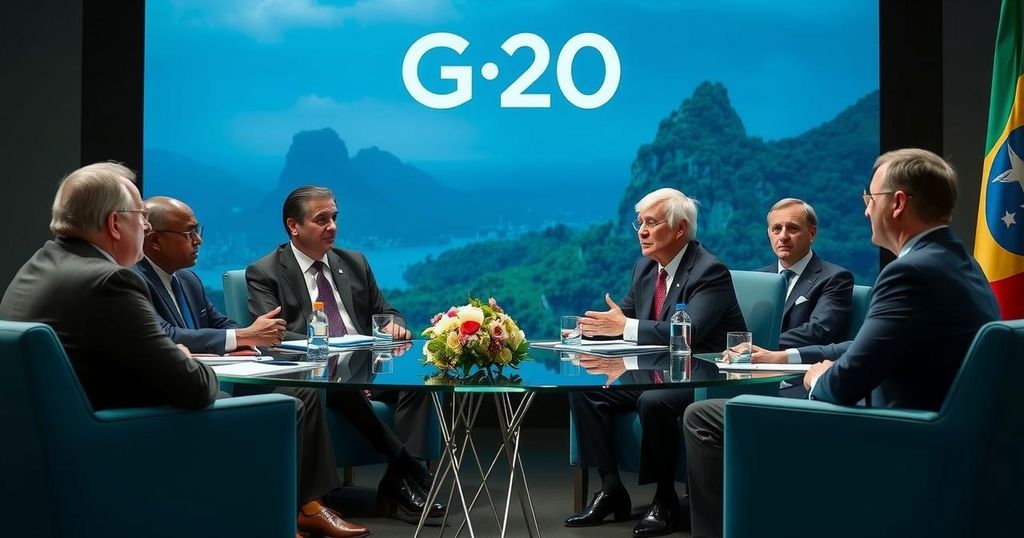G-20 leaders are convening in Rio to focus on sustainable development and cleaner energy. The meeting emphasizes the urgency of combating climate change as negotiations for COP29 approach. They called for increasing climate finance and highlighted the critical need for rich nations to assist developing countries. The G-20 is also committed to a treaty addressing plastic pollution by 2024.
On the concluding day of the summit in Rio de Janeiro, G-20 leaders are prioritizing discussions on sustainable development and the transition to cleaner energy. This dialogue aims to strengthen prospects for a fruitful outcome at the United Nations climate talks in Azerbaijan. The host of the upcoming COP29 climate summit urged G-20 nations to demonstrate their commitment to combating climate change, especially as negotiations had encountered significant challenges in Baku, Azerbaijan. As the world approaches potentially its hottest year on record, G-20 leaders express urgency in addressing climate change, particularly in light of the upcoming return of Donald Trump to the U.S. presidency, who has signaled intentions to withdraw from the Paris Agreement and retract U.S. climate policies. In a joint statement released on Monday, the leaders emphasized the necessity of dramatically increasing climate finance from billions to trillions to support global climate initiatives. The G-20 consensus highlights the need for negotiators at COP29 to establish a new financial target regarding commitments from wealthier nations to developing countries for climate support. Although the statement calls for resolution on this matter, it refrains from suggesting specific solutions for the U.N. summit, slated to conclude on Friday. Experts advocate that this financial goal should be no less than $1 trillion annually, while developed nations insist on broadening the financial contributors to include affluent developing nations like China. Conversely, countries such as Brazil, the G-20 host, resist expanding obligations to developing countries, citing their historical role in the climate crisis. Preliminary discussions suggested a potential voluntary contribution from developing nations, though such provisions were omitted from the final agreement. In his opening remarks, President Luiz Inacio Lula da Silva asserted that the effects of climate change are visibly impacting the world and require immediate attention. G-20 members are pivotal in the global climate response, as they account for 85% of the global economy and over three-quarters of emissions contributing to climate change. Furthermore, the leaders committed to achieving a legally binding treaty to mitigate plastic pollution by the end of 2024, with negotiations set to restart next week after two years of discussions.
The G-20 summit serves as a key platform for world leaders to collectively address pressing global issues, particularly climate change, which poses a significant threat to sustainable development. As the largest economies, G-20 nations significantly influence global economic trends and emissions, which directly impact climate change. The upcoming COP29 in Azerbaijan is critical for pursuing collaborative solutions to climate financing and to ensure that negotiations on climate commitments are productive and yield tangible results.
In summary, the G-20 leaders are currently gathered in Rio de Janeiro, prioritizing vital discussions surrounding climate change and clean energy transitions. The urgency stemming from the upcoming U.S. presidential shift and the increasing global temperatures underscores the necessity for robust climate finance and a united approach in addressing climate issues. Moving forward, reaching a consensus on financial obligations to developing nations and finalizing a treaty to address plastic pollution are critical steps in combating climate change effectively.
Original Source: www.straitstimes.com







